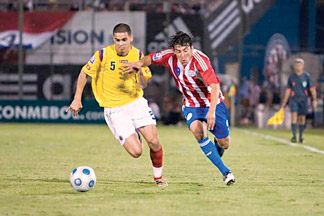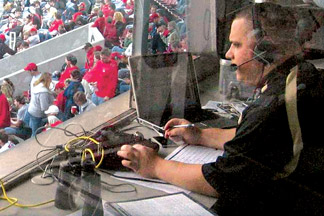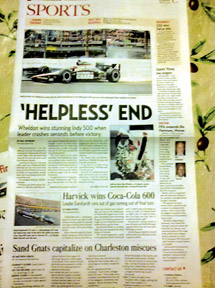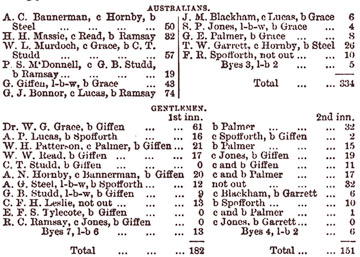|
The exciting world of the sports journalist :
Capturing the drama while keeping score
Gaston de Rosayro
|

A soccer match
|
The sports beat is one of the most exciting in all of journalism.
From the thrill of victory to the agony of defeat, sports stories are
all about the all-too human drama of competition and courage. A sports
writer has the responsibility to both entertain and inform people about
what is occurring within the world of sports.
Some writers focus on one particular sport whereas others write on
all such activities within a given area. Those sports writers who work
freelance pick their sporting events to cover, whereas those who work
for a publication, radio of TV are usually assigned stories. Both types
of sports writers have to be able to capture the exhilaration and
interest of the reader as well as provide an accurate depiction of the
event or issue that they are writing on.
|

A sports journalist |
The planning and coverage of sports and the audience you are aiming
at is an important feature. Later you can concentrate around the
presentation of your story. Be aware that news writing style is just as
important for sports reporting as it is for general news, business
stories or any other journalistic work.
Sports coverage is among the most important in any medium. There are
fanatical fans of diverse sports everywhere. Remember you are reaching
out to a varied and intelligent audience. But remember readers of the
sports pages of a newspaper are extremely discriminating.
They are generally the most knowledgeable and critical readers of
all. They know a lot about sport themselves and they expect a sports
writer to know at least as much. This is also true of people who listen
to sport on radio or watch it on television.
Getting a feel on sports writing can at first seem daunting because
there are so many different kinds of stories that can be written. For
the aspiring sportswriter, these are some of the main types. The
straight lead game story is the most basic story in all of sports
writing. It is just what it sounds like. It is an article about a game
that uses a straight-news type of lead. The lead as discussed earlier
summarizes the main points - who won, who lost, the score and how the
star players performed. Feature-lead game stories are common for
professional sports. Readers usually already know the score of these
games as soon as they end. So when they pick up a sports section they
want stories that offer a different angle on what happened and why.
|

A sports column |
So, while it is true that everything you write as a journalist should
be accurate, you will never get away with inaccuracies in sports
reporting. But what actually are sports audiences looking for? Firstly
sports readers and listeners insist on accuracy and reliable assessment.
They will be expecting the sports reporter to know when to pay tribute
to an accomplishment and when to censure a jaded performance, when to
offer encouragement and when to call for tactical changes.
Certain reading enthusiasts have played their favourite sports and
consider them almost a religion. But they like to watch the game.
They are knowledgeable and like to discuss past and present
performances and air their opinions on future prospects. While most
sports readers and listeners are very keen and informed, you should
remember that there are also people reading or listening in a casual
way. They may not have any strong commitment to sport, but will read the
occasional report if it looks or sounds particularly interesting or
entertaining.
These people will require more information than the average reader or
listener, if they are fully to understand what is being reported. Anyone
can print the final score of any game but it takes detail and creative
language to win sports readers.
|

A sports lead story |
The trick to writing sports is not just to report the scores but to
try to tell what happened. Readers want to meet the players who made it
happen and have a front row seat to the game's action. You must remember
to focus on the important turning points and plays of the game or a key
player, and build your story around it.
It is true that the most important news aspect of a sports game is
the score. Who won? How did they win and what effect did the victory
have? Also important is whether we are writing from a home team
perspective.
Once you have the main information and key quotes out of the way, you
can go on to describe the game. Even better would be to describe just
one or two cameos and plays.
Lively quotes from the players or managers can give your story a
boost. Events do not always happen on the playing field, so if you
describe the crowd's mood, size or the effect they had on the game, it
helps keep your readers interested.
The sports world is full of colourful characters, so it is no
surprise that personality profiles are a staple of sports writing.
Whether it is a charismatic coach or a young athlete on the rise, some
of the best profiles anywhere are found in sports.
Season previews and wrap-ups are fixtures of the sportswriter's
repertoire. These are written any time a team and a coach are preparing
for the coming season, or when the season has just ended, either in
glory or infamy. Obviously the focus here is not a specific game or even
individual, but a broad look at the season - how the coach and players
expect things to go, or how they feel once that season is done.
|

A score of a match |
A column is where the sports writer gets to find expression for his
or her opinions, and the best sports columnists do just that,
fearlessly. Often that means being very tough on coaches, players or
teams who do not measure up to expectations, particularly at the
professional level, where all concerned are being paid huge salaries to
do just one thing - win.
Also try and figure out what your audience does not already know.
This is the reason why people should pick up the newspaper or listen to
your story on the electronic media. People rarely care enough to read
more about information they already know. Talk with photographers and
people in charge of graphics and ask them to run a picture with your
story. It helps to put a face with the name or event you are covering.
The world of sports journalism is full of opportunities if you have a
way with words and you know the intricacies of the game. But covering
sports in the journalism profession is not necessarily only about the
game itself.
It is about telling a story to the audience through reporting and
writing. Experienced sports journalists know how to lead the audience
into wanting more when they write. They tease with a well-baited great
hook, pulling in the reader.
Tease the audience when preparing your sports story or article. You
want people to be entranced enough to find out what you have to say. If
you watch teasers for sports on television, you can see examples of this
during the broadcast. Try not to provide all the information, but just
enough so that the audience wants to find out more.
After all, for sports journalists it is the name of the game!
[email protected]
|



